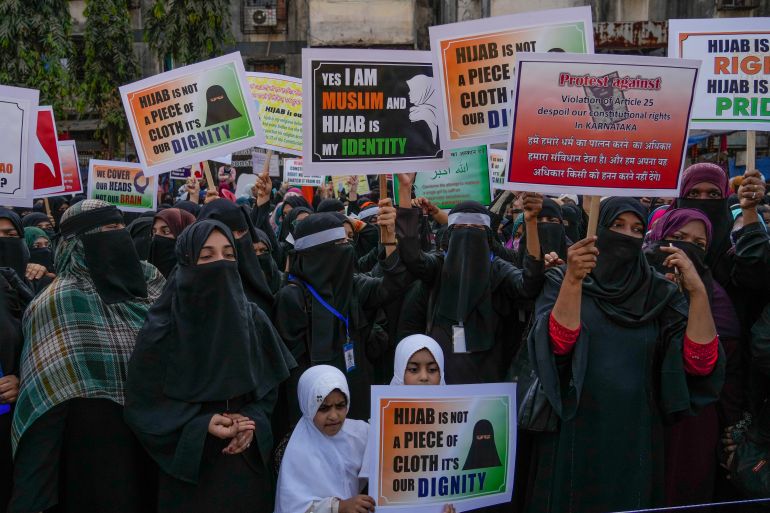Feminists need to oppose hijab bans as much as hijab mandates
From India to France, bigots are scared of the hijab. Why are Western feminists so deafeningly silent about this?

A little piece of cloth is scaring big governments again.
The latest instance is in India, where in early March the Supreme Court announced that it would set up a three-judge bench to hear a case challenging a hijab ban in educational institutions in the state of Karnataka. In October 2022, the top court had delivered a split verdict on the ban, which the Karnataka High Court had previously upheld.
Keep reading
list of 4 itemsFears of discrimination in Thailand despite looming same sex marriage bill
Hong Kong legislature passes tough new national security law
Why is India’s Citizenship Amendment Act so controversial?
As a result of the Indian hijab ban in educational institutions, thousands of girls have not been able to attend school for a year, and were denied even a temporary lifting of the ban for their practical exams this year.
And thanks to the same restrictions on religious dress in France, thousands of French women must choose between practising their sincerely held spiritual beliefs or pursuing their love for the sport of football.
The French Football Federation bans hijab-wearing women and girls from its competitions. The French senate in January of last year voted 160 to 143 to extend that ban to all sports competitions, though that move was ultimately defeated in the country’s parliament. Meanwhile, France’s hijab ban at state-run academic institutions remains in place.
As always, these bans have been justified by supporters, in part, as acts aimed at the emancipation of women. Nothing says women’s empowerment like policing women’s dress.
Why is it that the hijab is so often the obsession of bigots the world over? What is it about this piece of cloth that brings about so much passionate protest from detractors? And why are Western feminists so deafeningly silent when it comes to this type of state control of women’s bodies?
I asked myself these very questions when I received hate mail following my appearance on the Daily Show with Trevor Noah in 2016. In response to a question about my head covering, I told Trevor it was an act of spiritual devotion but, reversing roles, posed my own question to him. Paraphrased, I inquired “Oppression is the taking away of one’s power. So what are we really saying about women and the source of their power if they are oppressed when they privatise their sexual energy?”
Trevor slowly attempted a response, “We are saying they are only powerful when they are sexy in public?” he ventured timidly. “Did I get it right?” The audience roared and the clip went viral.
While I received an overwhelmingly positive response to the appearance, every piece of hate mail was about this segment. Mostly women, claiming to be “feminists” were incredulous that I dare attribute an empowering quality to the hijab, or point out the inherent misogyny of casting it as demeaning.
The great irony of course is that all these supposed “saviours” of Muslim women who want to liberate us from our religious dress because they claim it degrades and limits us, do just that by restricting or ridiculing our choices.
Indian and French girls must choose between their education and practising their faith, and thousands of French athletes must make a similar agonising decision between their careers and their creed.
How poetic it is that the very people who rightly decry the treatment of women under the Taliban, partially because the group bars women from education and athletics, support hijab bans that ultimately result in the same?
Some will point out that the hijab is indeed sometimes forced and sometimes politicised by authoritarian systems that do restrict women’s education and movement. So, they contend, it is a symbol of oppression that should be cancelled.
This argument denies women their agency. According to representative survey research conducted by the Washington-based Institute for Social Policy and Understanding, roughly half of Muslim women in the United States wear hijabs. The most popular reason given for why those who wear it do so is “religious devotion”, cited by roughly half. Next comes “so people know I’m Muslim” (21 percent), and “modesty” (12 percent). Just one percent of those who wear a hijab said it was in compliance with the wishes of a relative or husband.
But let’s take to its logical conclusion the argument that says anything that is sometimes coerced or politicised is inherently oppressive and must be opposed.
Let’s apply this idea to something else that is far more often forced on women than the hijab, and see where we end up: sex. One in four women are victims of sexual assault during their undergraduate education in the United States. And sexual violence is not only politicised, it is used as a weapon of war in conflicts from Bosnia to Ukraine.
So because sex is often forced and even weaponised, should it be banned? Should the state restrict consenting adult women from choosing in the name of women’s empowerment?
Should well-meaning self-proclaimed “feminists” shame and demean other women for making it a part of their lives?
If the answer is no, then perhaps this Women’s History Month, Western feminists should consider opposing hijab bans with as much ferocity as hijab mandates.
The views expressed in this article are the authors’ own and do not necessarily reflect Al Jazeera’s editorial stance.
